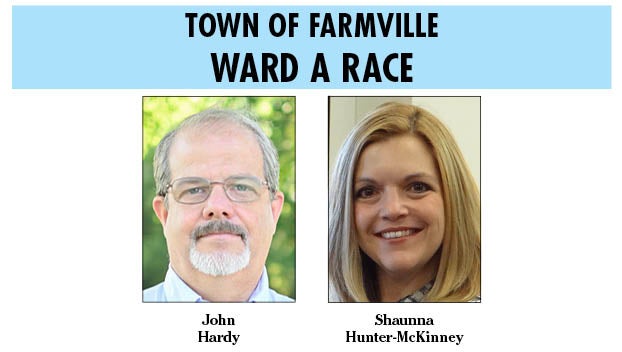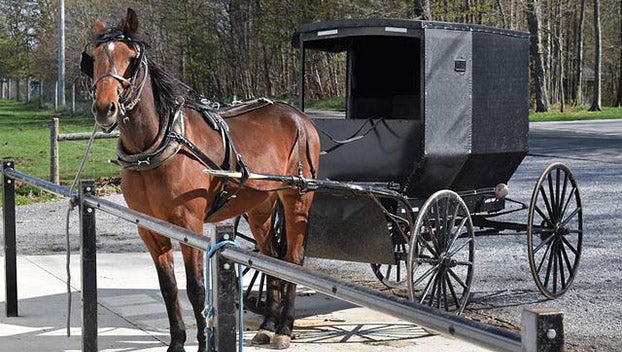Herald 2022 Candidate Q and A — Farmville Ward A race
Published 3:40 pm Friday, October 14, 2022
|
Getting your Trinity Audio player ready...
|
As we move into October, early voting has already started and for those who want to wait, it’s less than a month until Election Day. With that in mind, we’re reaching out to candidates in all contested races across our coverage area, asking them to answer several questions. Each candidate in a race receives the same questions and the same amount of time to send answers in.
The race for Farmville’s Ward A town council seat is a unique one, because nobody filed in time to make it on the actual ballot. As a result, we have a write-in election. When you go to vote, you have to write in the full name of your chosen candidate.
Two people have announced they’re running as write-ins for this race. John Hardy is a U.S. Navy veteran and Prince Edward County native, who has spent his professional career working in Farmville area businesses. Shaunna Hunter-McKinney is a longtime employee of Hampden-Sydney College, where she currently works as library director. She is also a Girl Scout leader, a member of the Central Virginia Regional Library Board, a board member for the local non-profit Prince Edward Christmas Mother and serves as President-Elect of the Rotary Club of Farmville.
1. What is the biggest challenge facing Farmville and how would you address it?
Shaunna Hunter-McKinney: A big challenge facing Farmville is resident disengagement. There are many valid reasons for why residents disengage, or never engage, their local community and government. People’s basic needs of housing, food, health, and family care have to be met before they can consider civic engagement. The pandemic has also impacted volunteerism and engagement, as many people felt it safer to stay at home.
Being disengaged can also result in being dismissive. In a local Facebook group, when members ask about where to acquire goods, services, or recreation in Farmville, more often than not the recommendation is to go outside the town to a different town or city. Similarly, many residents, myself included, wish for additional shopping options, especially a grocery store, but aren’t considering out of town shopping trips for groceries (that often include a meal out to eat and filling up the gas tank), ultimately hurt our chances of attracting a new business, as dollars are spent outside our area. It will not be easy to address this challenge, but as a member of Town Council I would be a tireless booster for Farmville, sharing information and encouraging residents to spend their time and energy here at home.
John Hardy: Farmville has a lot of potential as a community and our future is very closely tied to Prince Edward County. After all, the town is part of both Prince Edward County and Cumberland County. So, what is good for both counties is also good for the town and vice versa. Currently, our workforce is one of the biggest challenges in our area. Many businesses are having a hard time finding and keeping employees. There is also a need for more skilled laborers in the area. Farmville should take the lead with Prince Edward, Cumberland, local businesses, and community organizations to improve the schools, create better job opportunities, and promote economic development.
2. Over the last decade, we’ve seen Farmville’s population decline. How would you reverse that trend?
John Hardy: Unfortunately, the entire region, not just Farmville, has seen a population decline. This is not unusual for rural communities across the state and the nation. Farmville has long been a regional economic hub for the surrounding counties, and we need to continue to look for ways to create greater economic opportunities for the next generation. We have a hidden workforce in Longwood University and Hampden-Sydney College students who come to school here and want to stay but have limited or no job opportunities to keep them here. There are also those who grow up here, go away to college and then do not see job opportunities to bring them back home.
A step in the right direction to help reverse this trend is the Farmville Innovation Hub, which recently got its final funding in place. Additionally, we need to continue to work with Prince Edward on the development of the HIT Park, which is intended to help land a data center or some other type of technology-oriented business.
Shaunna Hunter-McKinney: Rural population decline is not unique to Farmville, and it creates the same issues many rural communities face, including a shrinking workforce to meet employer needs, and a shrinking tax base, resulting in less funds to support essential services like infrastructure and public schools – the very things needed to attract businesses and employees. I would work to reverse that trend by looking for ways to grow our population in various age groups, especially young adults and retirees.
The Farmville area is fortunate to have a public university, private college, and a community college within a few miles of town. For many reasons, a four year degree is not the path all high school graduates will seek, so working to promote community college and vocational programs to high school students is a way to prepare young people for good paying careers in local businesses right here in Farmville. There are programs to assist with college affordability available, like Virginia G3, a tuition assistance program for students interested in Information Technology, Public Safety, Healthcare, Skilled Trades, Construction and Welding Programs, or Early Education.
Lower cost of living alone will not attract retirees to our area, so support for an aging population, including recreational and social opportunities, and improving access to and quality of local health care, is also important.
3. Current or planned projects will help improve broadband around town. What are other infrastructure improvements the town needs?
Shaunna Hunter-McKinney: In addition to improved broadband, town roadway safety and thoroughfare routes need improvement. The Farmville 2035 Transportation Plan, available under the Community Development page on the Town of Farmville website, lays out a number of shorter and long-term projects, including projects to “construct a new north-south route across the Appomattox River to the east of Main Street, including a new bridge” and “construct the East U.S. Route 460 Interchange.”
Anyone who drives through downtown Farmville, in a passenger or a commercial vehicle, has seen how challenging it is for heavy trucks to safely pass through the area, especially if they need to turn off Main Street. Constructing a U.S. Route 460/East Third Street interchange would improve traffic congestion and flow, improve access to vacant land available for development on Third Street, and make it easier for residents, visitors, and pass-through drivers on Route 460, to access all areas of town.
John Hardy: In addition to broadband in Farmville and the surrounding areas, there are many ongoing and future projects in the works for our community, which include power grid upgrades to have many of the cables buried, preventing outages, upgrading the sewer and water lines in town which would allow for a larger population in the future, as well as creating green spaces to provide shade and further beautify our community. This is a great start to maintain Farmville’s stability and keep us moving in the right direction.
4. The current council is looking to change Farmville’s charter. In addition to the ones being discussed, are there any changes you would like to make?
John Hardy: I feel confident that the current administration has this covered. The town charter should not be changed unless the town changes in ways that the charter did not anticipate. The current council, attorneys and consultants have worked hard to update and amend the charter, so we likely do not have to go through changes again anytime soon.
Shaunna Hunter-McKinney: When starting any new position, I think it is important to learn and listen before suggesting changes. I also think it is important to prepare beforehand, so I read the Town’s current charter on the Virginia Legislative Information System website, and compared it to the Proposed Town Charter Update document posted on the Town of Farmville website. The proposed updates not only remove outdated and obsolete practices, they make the overall charter shorter and clearer in its wording.
In place of very specific language like Town Council having powers to “regulate the width of sidewalks on the streets,” or the boundaries of the town containing “846 acres more or less,” the proposed updates grant powers “pertinent to the conduct of a town government” and in compliance with the laws of the Code of Virginia, and the Constitution of Virginia. This makes sense, especially considering the General Assembly must approve a new Town Charter. Town Council hired the law firm of Hefty Wiley and Gore, a firm that specializes in legal government affairs solutions and serves many local and regional governments in Virginia, to advise during the revision process.
A summary of the changes and the Proposed Town Charter Update are available to the public, and a public hearing to receive public comments was scheduled for October 12, 2022.
5. What role does Longwood University play in the town’s future?
Shaunna Hunter-McKinney: I hear skepticism about Longwood University’s influence on the town, and see comments online that Farmville only accommodates, or caters to, Longwood. I can understand the sentiment, especially if a resident or their family has little contact with the university, but it is impossible to deny Longwood’s economic impact on the town and county. According to the Virginia Employment Commission, Longwood is the largest employer in Prince Edward County, with 500-999 employees.
The actual number of full-time employees is close to 700, not counting contract employees working for companies like Aramark, Longwood’s dining services provider. The university enrolls approximately 5,000 students, and while they are not permanent residents, one only needs to go shopping or out to eat in town to see the students contributing to the local economy. I don’t think it is an oversimplification to say what is good for Longwood is good for Farmville. Lines of communication need to stay open between town government and university administration, especially when it comes to expansion outside the boundaries of campus, but a quick look at Longwood’s presence downtown points to investment in the greater Farmville community. The Longwood Center for the Visual Arts, High Street Theatre, Barnes & Noble at Longwood, and the new Innovation Hub planned for Midtown Square are not exclusive to Longwood faculty, staff, and students.
Longwood wants Farmville to be a place not only their students, but employees of all ages, with or without families, call home.
John Hardy: Longwood University has been and will always be an important economic building block for the town. There are a lot of other large businesses that play a part as well. Hampden-Sydney College impacts the town greatly, as do Centra Southside Community Hospital, Green Front Furniture, Walmart, and others. There are also a great number of small businesses that are the essence of what Farmville is all about and make a great impact on jobs and revenue for the town.
6. What can Farmville do to better market itself to the rest of the Commonwealth and beyond?
John Hardy: I think Farmville seems to be doing a good job marketing itself and I’m not sure we can do a great deal better. With the web-based marketing, coupled with several unique assets like High Bridge Trail, Moton Museum and the Farmer’s Market and several destination businesses, Farmville experiences a significant amount of traffic during the weekends. In addition, Farmville has recently received a good bit of recognition as one of the top small towns in Virginia.
Shaunna Hunter-McKinney: The best way for Farmville to better market itself to the rest of the Commonwealth and beyond is to not go it alone. Examples of cooperation are communication between the Town of Farmville and Prince Edward County Economic Development departments and Planning Commissions, and participation in organizations and associations that provide support, training, promotion, and legislative advocacy for local governments like the Virginia Municipal League, Virginia Economic Development Partnership, Virginia Association of Museums, and the Virginia Tourism Corporation.
Farmville really does have a lot going for it, and the more organizations that can help Farmville learn from other communities’ efforts, and get our information out, the better.
7. What is your vision for Farmville? How would you like to see it change in the next 5-10 years?
Shaunna Hunter-McKinney: In libraries we are always seeking to eliminate barriers to access, and to be a welcoming and useful space for all. Modern libraries have simplified policies, eliminated fees (no more late fines!), provided services and programming for our communities, and still, some will always feel the library is not a space for them. We need to continually seek to be open and communicating with all residents, because the town is the same – there are spaces and places not all feel welcome, or simply don’t know about.
Do residents know Town Council meetings are open for public attendance? That meetings are broadcast online, or that residents unable or uncomfortable attending in person – for whatever reason, can ask to participate by phone?
In my vision for Farmville, over the next 5-10 years, I’d like to see a town where university and town continue to work together, and where priorities are set to make improvements across town, in all neighborhoods. I’d like to see more parks, more pedestrian and bicycle friendly options, and more done to take advantage of the natural environment, especially the area along the
Appomattox River. I’d like to see the town continue to plan more free events that bring the community together, like the National Night Out event held in Riverside Park this past August. I’d like to see more participation in local government and community-based organizations, for after all, local government decision making and spending directly impacts residents’ day to day lives.
John Hardy: Farmville is a wonderful place to live and work. It has a small-town feel but is large enough to provide almost all its own needs and those of the surrounding community. Given that the Town and several surrounding counties have seen a population decline, one option is to move Farmville towards being a technology-based town that is attracting creative and innovative businesses as well as top tier technology companies that are attractive to the younger workforce.
To do this, we should grow our good working relationships with the counties, Longwood University, Hampden-Sydney College, and local businesses to which will better facilitate growth in that direction.






